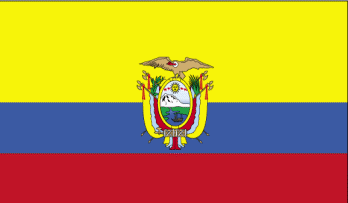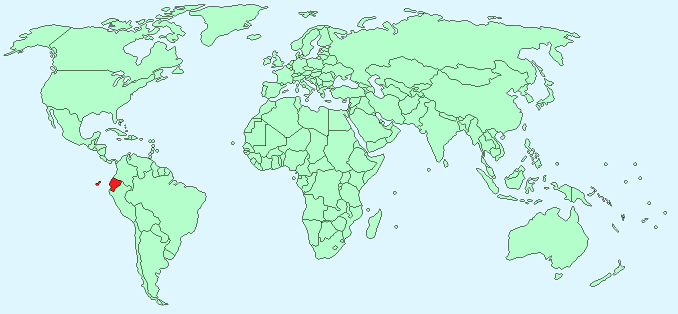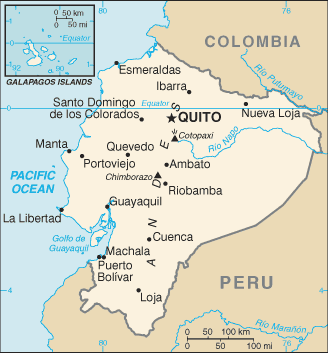Ecuador


Continent – South America
Size – 283,560 km²
Geography – coastal plain, central highlands, eastern jungle, Galapagos Islands
Language – Spanish, Quechua
Religion – 95% Roman Catholic, 5% other
Monetary Unit – U S Dollar
Natural Resources – petroleum, fish, timber, hydropower
Agriculture – bananas, coffee, cocoa, rice, potatoes, manioc (tapioca), plantains, sugarcane; cattle, sheep, pigs, beef, pork, dairy products; balsa wood; fish, shrimp
Industry – petroleum, food processing, textiles, wood products, chemicals

Neighbouring Countries – Colombia, Peru
Population – 15,654,411 (2014 estimate)
Population Growth Rate – 1.37%
Average Life Expectancy – 76.8
Capital City – Quito (1,671,191)
Largest City – Guayaquil (2,291,158)
Highest Mountain – Chimborazo (6,267 m)
Longest River – Napo (885 km total length)
Climate – coastal region – tropical, hot, humid 18°C to 32°C, mountain region – warm days and cool nights – 7°C to 23°C, eastern region, tropical, hot, humid
22°C to 32°C, Galapagos Islands – tropical, warm 19°C to 31°C
Yearly Rainfall – coastal region 97 cm (approx) mostly January to April, mountain region – 110 cm (approx), eastern region 245cm (approx) mostly December to July, Galapagos Islands – 10cm (approx) mostly January to April
Plant Life – jungle forests, savanna grasses, low shrubs, ceiba trees, potatoes, corn
Animal Life – llama, guinea pig, small mammals and reptiles – Galapagos Islands – tortoises, iguanas,
Bird Life – condor – Galapagos Islands 85 bird species including hood mockingbirds, swallow-tailed gulls, blue footed boobies, Nazca boobies, Galápagos hawks, finches, waved albatross, cormorant, pelican, frigate birds, terns, penguin
Fish Aquatic Life – shrimp – Galapagos Islands – fur seals, sea lions, whales, dolphins, marine turtles, crabs
Harvard Reference for this page:
Heather Y Wheeler. (2015). Ecuador. Available: https://www.naturalhistoryonthenet.com/Facts_Figures/Country_Facts/ecuador.htm. Last accessed Monday, July 18, 2016
Facts and Figures Pages
